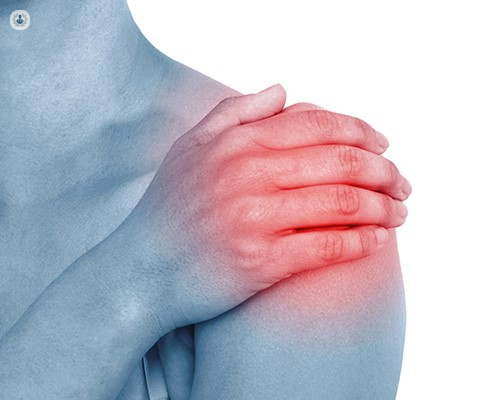All you need to know about shoulder instability
Escrito por:Read this article below to find out all about shoulder instability, as leading consultant orthopaedic surgeon, Mr Shyam Kumar, provides us with a detailed guide.

What is shoulder instability?
Shoulder instability is a condition where the head of the upper arm bone (humerus) slips out of the shoulder socket (glenoid). This can happen partially (subluxation) or completely (dislocation). It can cause pain, swelling, and weakness, as well as a sensation of the shoulder giving way.
What are the main causes of shoulder instability?
Some possible causes of shoulder instability are:
- Trauma or injury to the shoulder, such as a fall or a collision
- Overuse of the shoulder, especially in sports that involve throwing or overhead movements
- Loose ligaments or tendons that make the shoulder joint too flexible
- Muscle weakness or imbalance around the shoulder joint
- Genetic factors
How is shoulder instability typically diagnosed?
To diagnose shoulder instability, a specialist will examine your shoulder and ask about your medical history and symptoms. You may also need imaging tests, such as X-rays, MRI, or ultrasound, to check for any damage to the bones, ligaments, tendons, or cartilage of your shoulder.
How is shoulder instability treated most effectively?
Treatment for shoulder instability depends on the severity and type of your condition. Some common options are:
- Resting your shoulder and avoiding activities that cause pain or instability
- Taking anti-inflammatory medications to reduce pain and swelling
- Doing physical therapy exercises to strengthen the muscles around your shoulder joint
- Wearing a sling or brace to support your shoulder and prevent further injury
- Undergoing surgery to repair shoulder joint discomfort
Once the acute phase is over, some home remedies that may help with shoulder instability are:
- Doing gentle stretches and range-of-motion exercises for your shoulder as instructed by your doctor or physical therapist
- Practicing good posture and avoiding slouching or hunching your shoulders
- Modifying your activities and avoiding movements that cause pain or instability.
Surgery may be required for shoulder instability if:
- You have chronic or recurrent shoulder dislocations that do not improve with nonsurgical treatment
- You have significant damage to the bones, ligaments, tendons, or cartilage of your shoulder joint
- You have nerve injury or loss of sensation in your affected arm as a result of the dislocation.
If you’d like to book an appointment with Mr Shyam Kumar today, just head on over to his Top Doctors profile.


